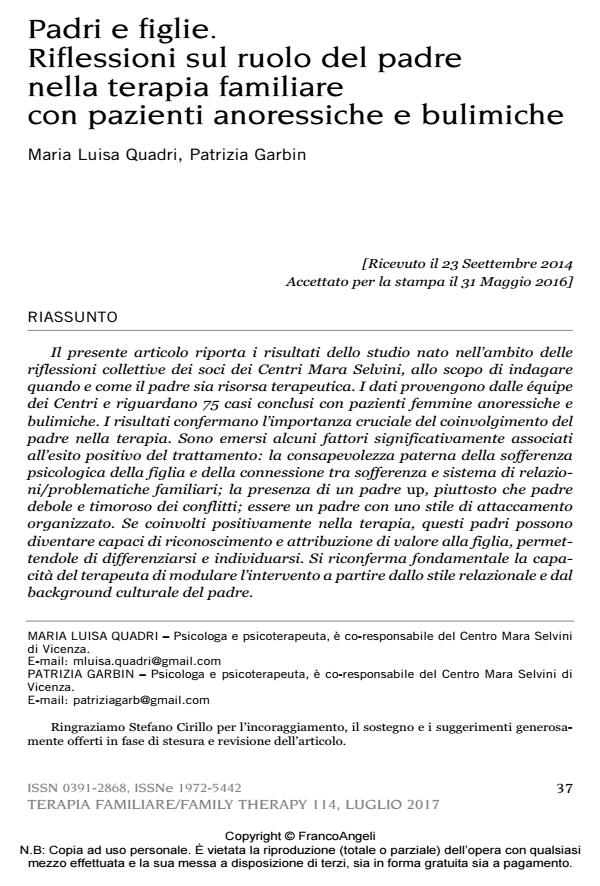Fathers and daughters. Reflections about the role of the father in family therapy with anorexic and bulimic patients
Journal title TERAPIA FAMILIARE
Author/s
Publishing Year 2017 Issue 2017/114
Language Italian Pages 24 P. 37-60 File size 229 KB
DOI 10.3280/TF2017-114003
DOI is like a bar code for intellectual property: to have more infomation
click here
Below, you can see the article first page
If you want to buy this article in PDF format, you can do it, following the instructions to buy download credits

FrancoAngeli is member of Publishers International Linking Association, Inc (PILA), a not-for-profit association which run the CrossRef service enabling links to and from online scholarly content.
The present article provides the outcomes of the research arisen within the collective considerations of the members of the Mara Selvini Centers with the scope to examine when and how the father is a therapeutic resource. The data come from the Mara Selvini centers’ equips, regarding 75 treatments with anorexic and bulimic female patients ended between 01.10.2010 and 31.03.2012. The results confirm the crucial importance of the paternal involvement in the therapy. Some elements connected significantly to a positive conclusion of the treatment emerged: the father’s consciousness of the psychological sufferance of the daughter and of the connection between the sufferance and the relationships/problems system of the family; the presence of a father up rather than a weak father fearful of conflicts; to be a father with an organized attachment system. If positively involved in the therapy, these fathers may become capable of recognizing and valuing the daughter, thus allowing her a self-differentiation and a self-individuation. It is confirmed fundamental the capability of the therapist to modulate the intervention starting from the relational style and the cultural background of the father.
Keywords: Paternal role, anorexia, bulimia, new fathers, opinions and attitude of the father, therapist conduction.
- L’évolution des pères... et celle des thérapeutes Stefano Cirillo, Matteo Selvini, Anna Maria Sorrentino, in Cahiers critiques de thérapie familiale et de pratiques de réseaux /2019 pp.11
DOI: 10.3917/ctf.062.0011
, Padri e figlie. Riflessioni sul ruolo del padre nella terapia familiare con pazienti anoressiche e bulimiche in "TERAPIA FAMILIARE" 114/2017, pp 37-60, DOI: 10.3280/TF2017-114003